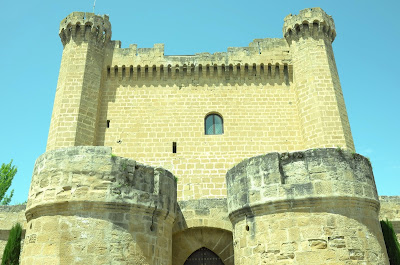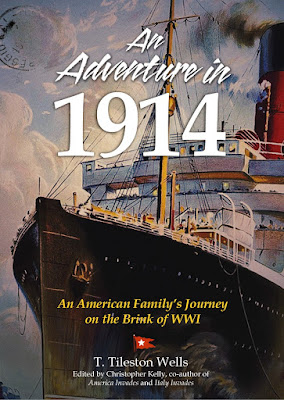 |
| Church Door, Haro, Spain |
I was delighted to "invade" Spain recently on a Duvine bicycle tour through the Riojo wine region (highly recommended!). The Italians, of course, got there long before me. Here is the Spain chapter of Italy Invades: How Italians Conquered the World...
 |
| Me and Stuart Laycock with Trajan -- A Spanish-born Emperor |
The Romans first arrived in Spain during the Second Punic War. With Hannibal off to invade Italy, the Romans took the opportunity to attack the Carthaginian Empire that Hannibal’s family had built up on the Iberian Peninsula.
After a long series of campaigns involving multiple armies and commanders, the Romans eventually defeated the Carthaginian forces in Spain and took control of areas previously controlled by Carthage, mainly along the southern and eastern coasts of Spain.
 |
| Trajan's Column, Rome, Italy |
Then in 155 BC, the Lusitanian War broke out, involving much action on what is now Spanish soil. A massacre by Roman troops ended that war in 150 BC; but war erupted again in 146 BC as a man who would become legendary, Viriathus, led the Lusitanians against the Romans. This bitter war, fought both on territory that is now Portuguese and on territory that is now Spanish, dragged on until 139 BC, when Viriathus was assassinated by three of his own men.
Meanwhile, to the north, the Romans had become engaged in a titanic struggle against the city of Numantia. The war finally ended in 134 BC when Numantia fell to besieging Roman forces.
In 132 BC, the Romans took the Balearic Islands.
 |
| Roman columns in Barcelona, Spain Temple of Augustus (http://www.barcelonalowdown.com/the-roman-temple-of-augustus/) |
Plenty more fighting linked to Rome’s civil wars followed in Spain. Then in 29 BC, Augustus launched the Cantabrian Wars to take control of an area in northern Spain that remained outside Roman control. Within ten years, the war was mainly finished. More minor clashes would ensue, but after a process of conquest taking about two hundred years, the Roman occupation of Spain was finally finished.
In the early fifth century, invaders who had crossed the Rhine and then crossed Gaul arrived in Spain, producing yet more fighting.
 |
| 15th Century Castle (Castillo), Spain |
During the Renaissance, the Spanish Borgia family would rise to the height of the papacy with the ascension of Pope Alexander VI. His bastard son, Cesare Borgia, would launch many an invasion in Romagna before his ultimate exile and imprisonment in Spain.
 |
| Lord Nelson, Trafalgar Square, London |
Italians again fought in the Carlist Wars in Spain in the nineteenth century; and in 1870, an Italian, Amadeo of Savoy, a son of King Victor Emmanuel II, was selected to be King of Spain. He found the job impossible, and in 1873, he had had enough and gave it up.
The Italian effort during the Spanish Civil War started with air power, as Italian aircraft attacked the Republican fleet in the Straits of Gibraltar. They then airlifted Nationalist troops from Africa to Spain, a crucial step in giving Franco the ability to challenge the Republican government on the Spanish mainland.
 |
| Corpo Truppe Volontarie, Spanish Civil War |
An Italian offensive in March 1937 against Madrid— the Battle of Guadalajara—achieved only limited gains against determined Republican opposition, and Mussolini gave orders to increase Italian efforts. In October of that year, the Italian presence was openly and officially admitted.
Italian troops fought on all fronts in the war and in a large number of clashes. Italian aircraft also saw extensive action, and 175 pilots died in action. Three Italian planes participated in the bombing of Guernica. At sea, Italian Navy surface ships and submarines also sank Republican vessels and merchant ships.
 |
| Church Door, Ezcaray, Spain |
Over three thousand Italians, however, fought on the Republican side in Spain, joining units such as the Garibaldi Battalion of the International Brigade.

During World War II, Spain remained neutral, though it was friendly to the Axis cause. The Italian Navy took advantage of a derelict tanker, the 4,900 ton Olterra moored in the waters near Algericas, by installing members of the X Flottiglia MAS inside its hull. From this base in Spanish waters, they launched a series of attacks against shipping in the Bay of Gibraltar with two-man minisubmarines called Maiale (pig).
Spain joined NATO in 1982."
Travel Notes: Special thanks to Jimmy and Alex of Duvine...www.duvine.com
You can buy signed copies of Italy Invades: How Italians Conquered the World
here..www.italyinvades.com
You can find regular copies here on Amazon...www.amzn.com/1940598729
The Complete Italy Invades Gift Package can only be found here...
http://store.italyinvades.com/products/italy-invades-gift-package
The Complete Italy Invades Gift Package can only be found here...
http://store.italyinvades.com/products/italy-invades-gift-package
NOW IN PAPERBACK FOR ONLY $13.99...http://store.americainvades.com/products/italy-invades-how-italians-conquered-the-world-paperback-book






































